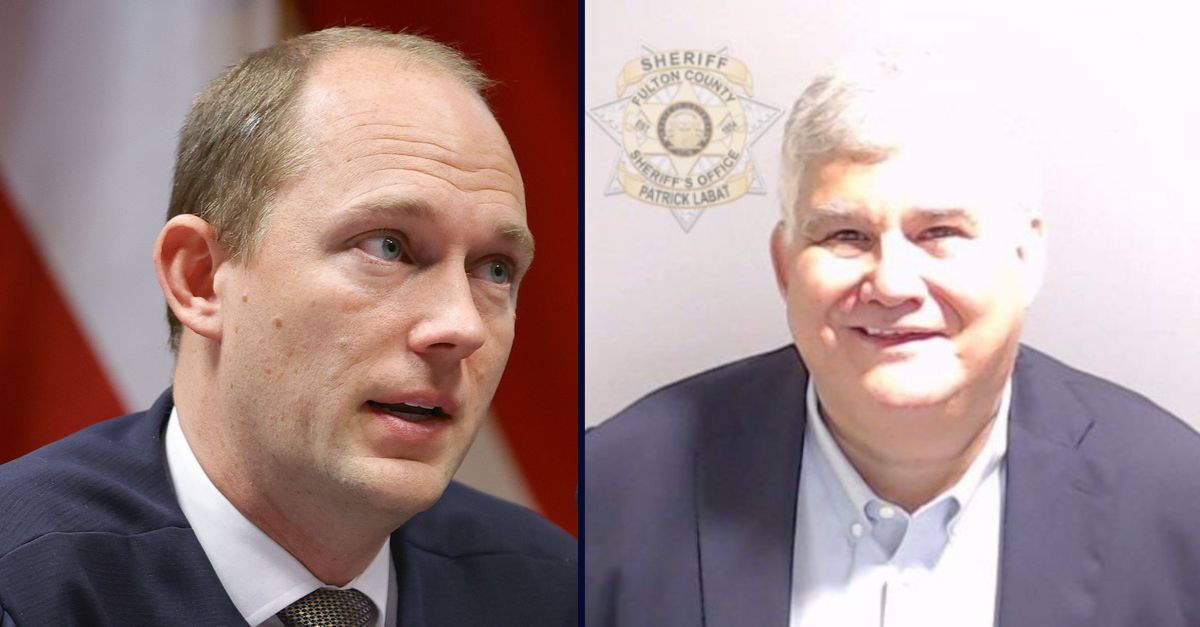
Left: Fulton County Superior Judge Scott McAfee (AP Photo/Alex Slitz, Pool, File); Right: Former Georgia GOP chair David Shafer (Fulton County Sheriff’s Office)
The judge overseeing the Georgia racketeering (RICO) and election interference case against Donald Trump denied a motion by the former chairman of the Georgia Republican Party to dismiss election subversion charges based around the fake electors scheme.
David Shafer, the erstwhile Peach State GOP head, was charged in the August 2023 indictment with eight counts including impersonating a public officer, forgery in the first degree, false statements and writings, and criminal attempt to commit filing false documents.
In motions, and during a late March hearing in Fulton County, Shafer’s attorney, Craig Gillen, argued the indictment was defective because of the way prosecutors referred to the legally-suspect effort to have alternate, “contingent,” or fake electors deliver Electoral College votes to the 45th president instead of Joe Biden in several swing states.
“While special demurrers typically contend the charging instrument contains insufficient detail, here, the Defendant does not complain that the indictment is defective because it lacks necessary information,” Fulton County Superior Court Judge Scott McAfee explained in the April 4 denial order. “Instead, he suggests certain charges must be dismissed because they contain too much, and that what they contain is legally inaccurate.”
Shafer’s defense argued that three phrases should be struck from the indictment: (1) “duly elected and qualified presidential electors”; (2) “false Electoral College votes”; and (3) “lawful electoral votes.”
To hear the defense tell it, those phrases are conclusory and “improper legal conclusions” that, essentially, prove the allegation being asserted and should only be advanced during a trial.
Under Georgia law, McAfee explains in the order, a court has “the inherent power — indeed the obligation — to redact an indictment that contains prejudicial surplusage or extraneous material.”
The kind of information that should be stricken from an indictment includes a co-defendant’s guilty plea, a defendant’s criminal record, or a reference to the defendant’s fingerprint, the judge explains.
Shafer did not identify anything like that, McAfee ruled.
“[T[he challenged language is not prejudicial because it accurately describes the alleged offenses and makes the charges more easily understood by provided a basis to differentiate the allegedly lawful and unlawful acts of presidential electors (as theorized by the State),” the three-page denial order notes.
McAfee goes on to explain that an indictment itself is not evidence and, in his courtroom, procedure requires reminding jurors on at least three separate occasions that an indictment is not evidence.
“An indictment is not subject to a demurrer or redaction simply because it contains unproven allegations or the State’s legal conclusions,” the judge’s order reads. “The very purpose of an indictment is to join issue on these issues.”
Ultimately, the court determined, Shafer’s motion did not single out any kind of defect or extraneous material but rather an explanation “that accurately describes the offenses and makes the charges more easily understood by the defendants and the jury.”
The judge said the proper place to contest how the state described the charges is during a trial — and denied an accompanying motion to dismiss because it relied on failed the motion to strike.
“A defendant retains the opportunity to challenge the entire indictment at trial,” the court’s order continues. “Because the Court finds no legal basis to strike this language, the Defendant’s claim that certain counts must be dismissed also fails, and the motion is denied.”
Have a tip we should know? [email protected]

